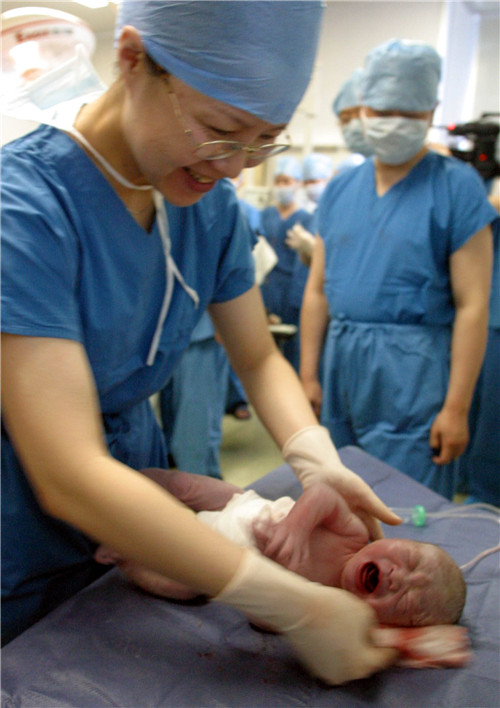 |
|
A doctor checks a newborn baby, a result of IVF technology, in Xi'an, Shaanxi province. RUAN BANHUI/CHINA DAILY |
In August, sensing a big business opportunity, Beijing Aibeike Technology Co Ltd, a startup, launched China's first app in the field of assisted reproductive services.
It started operations in Beijing, and has since set up three other agencies in Shanghai, Shenzhen and Macao.
It found demand was growing for fertility treatments and the specialist doctors concerned.
This can be attributed to hectic work life, unhealthy lifestyles, environmental pollution and stress, which combined to make many young couples infertile, said Huang Hefeng, director of the Reproductive Medical Center in Zhejiang province.
When China decided to end the decades-long one-child policy late last year, the demand for assisted reproductive services was expected to rise further.
Anticipating such surge in demand, Aibeike launched the app that connects customers with doctors and specialists at top hospitals.
People suffering from infertility problems can receive valuable information and consulting services from specialists using the app.
Appointments with doctors and treatment schedules, if found necessary during the online interactions, can be also firmed up.
"The app was introduced to particularly help women suffering from infertility so that they could receive counseling first and even the help of people who can accompany them to the hospital for treatment," said Shi Lei, CEO of Aibeike.
Shi sees tremendous potential in the market. For, relatively well-to-do Chinese couples who cannot biologically conceive a child are turning to a range of infertility therapies.
Despite the average cost of 100,000 yuan ($15,300) for a therapy, with extra services costing more, demand remains high, much of it still unmet. The wait list of couples seeking such services is believed to be growing longer all the time.
According to the World Health Organization, infertility and sterility are feared to become the third-most serious diseases worldwide in the 21st century, after cancer and cardiovascular diseases.
When a couple is unable to conceive the natural way in their first year of marriage, it is considered infertile, the WHO said.
In an interview with CNBC, Jason Spittle, global director of training at US medical device maker Cook Medical, said China will likely be the biggest in vitro fertilization or IVF market in the world within the next couple of years.
Shi said Aibeike has set up pregnancy centers around top hospitals, including the First Affiliated Hospital of Zhengzhou University and Peking University Third Hospital, and will start more in the future.
"The company will attract more specialists from well-known hospitals to the platform and come up with more promotions," said Shi.
